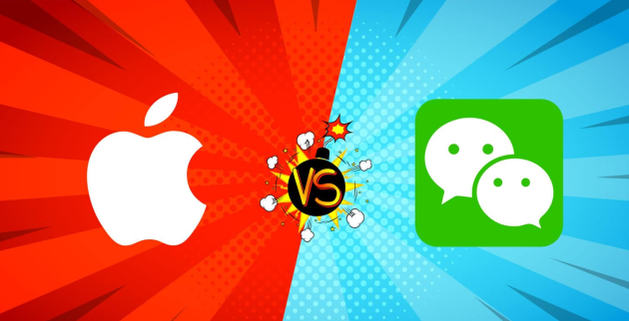Why doesn't Apple support dual-opening of apps?
Dual application refers to running two identical applications on one mobile phone at the same time!
App dual opening first appeared in the customized system of Android phones, and now it has become one of the standard features of most Android phones. Dual opening of applications can meet the needs of users to log in to different accounts on one mobile phone at the same time. For example, users may need to log in to two WeChat accounts, two QQ accounts, or two Alipay accounts at the same time. By dual-opening the application, users can easily switch between different accounts and avoid frequent login and logout operations, which greatly improves the user experience.
But so far, the Apple system has not yet applied the function of clone.
We all know that the iOS system is very powerful, and it should be very simple for them to create a dual-open application function. But dual-opening is common on Android phones, why doesn’t Apple do it?

1: Based on security and stability
The main reason why the iOS system does not support the dual-open function is for security and stability considerations.2: This is not the work of the iOS system itself
The vast majority of people need to use dual-open apps just because of WeChat.The reason why dual WeChat is needed is essentially because the workplace ecology is not good enough and employees will be disturbed even after get off work, so they need to create another identity. This kind of problem should be solved by App developers, and the operating system is only responsible for providing the platform.
For example, QQ on PC can log in to five or six people at the same time. Is this the credit of Windows? iOS has no obligation to customize exclusive functions for an App, and it is up to the App developer to solve the problem.
Three: WeChat doesn’t want you to have two accounts
Why don’t WeChat developers want users to use two WeChat IDs? This starts with the positioning of the software. WeChat is bound to a personal mobile phone number, and is positioned to take over a person's entire mobile social network. If users are allowed to open more accounts, then the "social information" conveyed by WeChat will become incoherent, unreal, and untrustworthy - the more you have, the lower the cost of giving up.
# Strictly speaking, the double-opening function of applications on Android phones is also a disguised plug-in. The principle is generally to use virtual machine technology to divide an area in the mobile phone's memory, making the App mistakenly think it is in another device, thereby realizing dual-opening of the application - this is obviously not a situation WeChat officials want to see.
Four: Apple does not understand Chinese local culture
We often mention a concept: product localization. In overseas markets, work matters are generally communicated via email, and only close friends and family members use instant messaging tools. But it is different in China. There are no "conditions" to draw a clear line between the two.
It is precisely because of the insight into our own needs that Android mobile phone manufacturers develop 100-watt fast charging to keep mobile phones full of blood at all times. The same applies to double-open applications. Only when you are in it can you feel the same way.
So the most fundamental reason why iOS does not support dual-opening of applications is that Apple does not understand us, does not pay enough attention to us, and does not understand China's local culture.

The application clone function is very practical for some users, but in order to maintain the user's data Privacy and security do not recommend that you use some methods to achieve clones on the iOS system.
Although the iOS system does not support the dual-open function, Apple also provides some other solutions, such as using multiple accounts to log in to iCloud, using the split-screen function, etc. According to the needs of users, you can also try to use it to achieve the purpose of avatar.
The above is the detailed content of Why doesn't Apple support dual-opening of apps?. For more information, please follow other related articles on the PHP Chinese website!

Hot AI Tools

Undresser.AI Undress
AI-powered app for creating realistic nude photos

AI Clothes Remover
Online AI tool for removing clothes from photos.

Undress AI Tool
Undress images for free

Clothoff.io
AI clothes remover

AI Hentai Generator
Generate AI Hentai for free.

Hot Article

Hot Tools

Notepad++7.3.1
Easy-to-use and free code editor

SublimeText3 Chinese version
Chinese version, very easy to use

Zend Studio 13.0.1
Powerful PHP integrated development environment

Dreamweaver CS6
Visual web development tools

SublimeText3 Mac version
God-level code editing software (SublimeText3)

Hot Topics
 1378
1378
 52
52
 deepseek ios version download and installation tutorial
Feb 19, 2025 pm 04:00 PM
deepseek ios version download and installation tutorial
Feb 19, 2025 pm 04:00 PM
DeepSeek Smart AI Tool Download and Installation Guide (Apple Users) DeepSeek is a powerful AI tool. This article will guide Apple users how to download and install it. 1. Download and install steps: Open the AppStore app store and enter "DeepSeek" in the search bar. Carefully check the application name and developer information to ensure the correct version is downloaded. Click the "Get" button on the application details page. The first download may require AppleID password verification. After the download is completed, you can open it directly. 2. Registration process: Find the login/registration portal in the DeepSeek application. It is recommended to register with a mobile phone number. Enter your mobile phone number and receive the verification code. Check the user agreement,
 Why can't the Bybit exchange link be directly downloaded and installed?
Feb 21, 2025 pm 10:57 PM
Why can't the Bybit exchange link be directly downloaded and installed?
Feb 21, 2025 pm 10:57 PM
Why can’t the Bybit exchange link be directly downloaded and installed? Bybit is a cryptocurrency exchange that provides trading services to users. The exchange's mobile apps cannot be downloaded directly through AppStore or GooglePlay for the following reasons: 1. App Store policy restricts Apple and Google from having strict requirements on the types of applications allowed in the app store. Cryptocurrency exchange applications often do not meet these requirements because they involve financial services and require specific regulations and security standards. 2. Laws and regulations Compliance In many countries, activities related to cryptocurrency transactions are regulated or restricted. To comply with these regulations, Bybit Application can only be used through official websites or other authorized channels
 Sesame Open Door Trading Platform Download Mobile Version Gateio Trading Platform Download Address
Feb 28, 2025 am 10:51 AM
Sesame Open Door Trading Platform Download Mobile Version Gateio Trading Platform Download Address
Feb 28, 2025 am 10:51 AM
It is crucial to choose a formal channel to download the app and ensure the safety of your account.
 gate.io sesame door download Chinese tutorial
Feb 28, 2025 am 10:54 AM
gate.io sesame door download Chinese tutorial
Feb 28, 2025 am 10:54 AM
This article will guide you in detail how to access the official website of Gate.io, switch Chinese language, register or log in to your account, as well as optional mobile app download and use procedures, helping you easily get started with the Gate.io exchange. For more tutorials on using Gate.io in Chinese, please continue reading.
 Sesame Open Door Exchange App Official Download Sesame Open Door Exchange Official Download
Mar 04, 2025 pm 11:54 PM
Sesame Open Door Exchange App Official Download Sesame Open Door Exchange Official Download
Mar 04, 2025 pm 11:54 PM
The official download steps of the Sesame Open Exchange app cover the Android and iOS system download process, as well as common problems solutions, helping you download safely and quickly and enable convenient transactions of cryptocurrencies.
 How to find the download link of Ouyi okx Android and Apple
Feb 21, 2025 pm 05:39 PM
How to find the download link of Ouyi okx Android and Apple
Feb 21, 2025 pm 05:39 PM
Ouyi OKX is a world-leading cryptocurrency exchange that provides users with a safe and convenient trading experience. Users can download Ouyi OKX's mobile apps, including Android and Apple versions through official channels.
 How to install and register an app for buying virtual coins?
Feb 21, 2025 pm 06:00 PM
How to install and register an app for buying virtual coins?
Feb 21, 2025 pm 06:00 PM
Abstract: This article aims to guide users on how to install and register a virtual currency trading application on Apple devices. Apple has strict regulations on virtual currency applications, so users need to take special steps to complete the installation process. This article will elaborate on the steps required, including downloading the application, creating an account, and verifying your identity. Following this article's guide, users can easily set up a virtual currency trading app on their Apple devices and start trading.
 Compilation and installation of Redis on Apple M1 chip Mac failed. How to troubleshoot PHP7.3 compilation errors?
Mar 31, 2025 pm 11:39 PM
Compilation and installation of Redis on Apple M1 chip Mac failed. How to troubleshoot PHP7.3 compilation errors?
Mar 31, 2025 pm 11:39 PM
Problems and solutions encountered when compiling and installing Redis on Apple M1 chip Mac, many users may...




